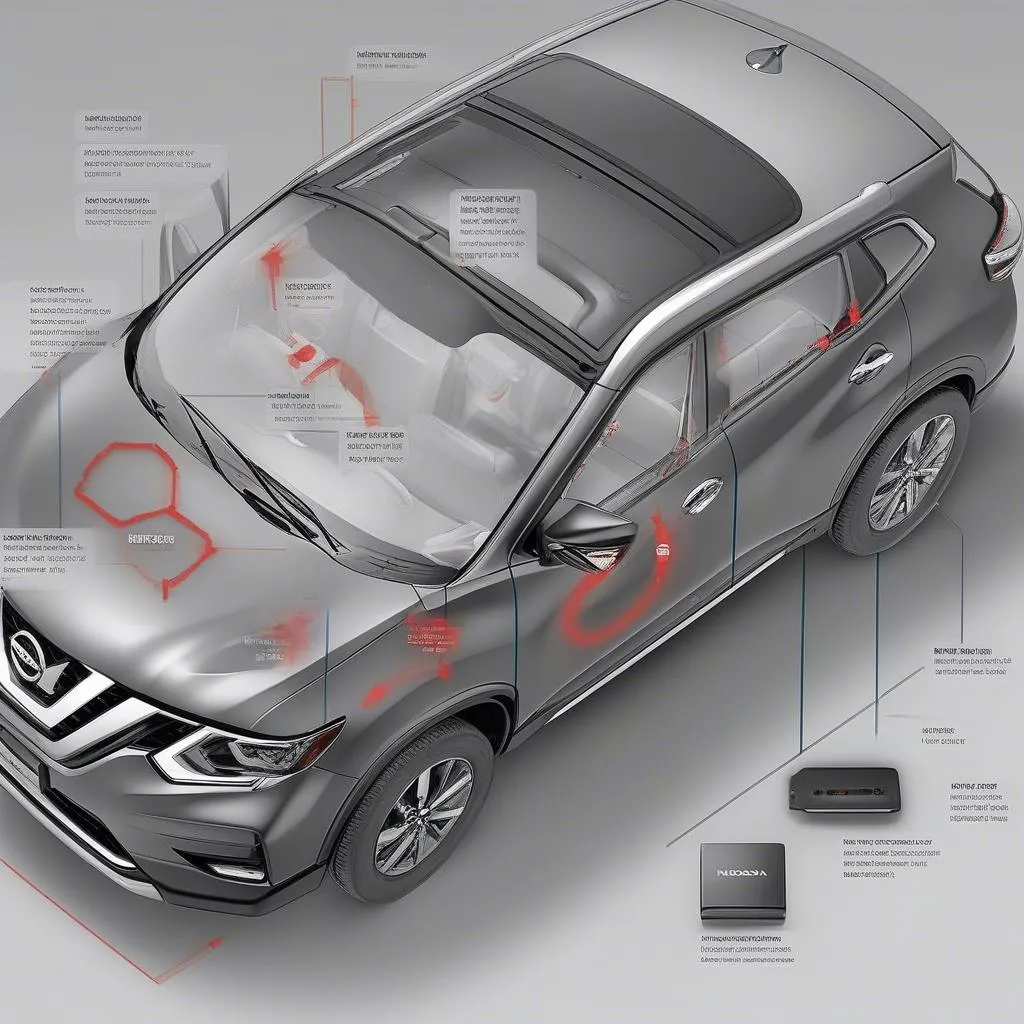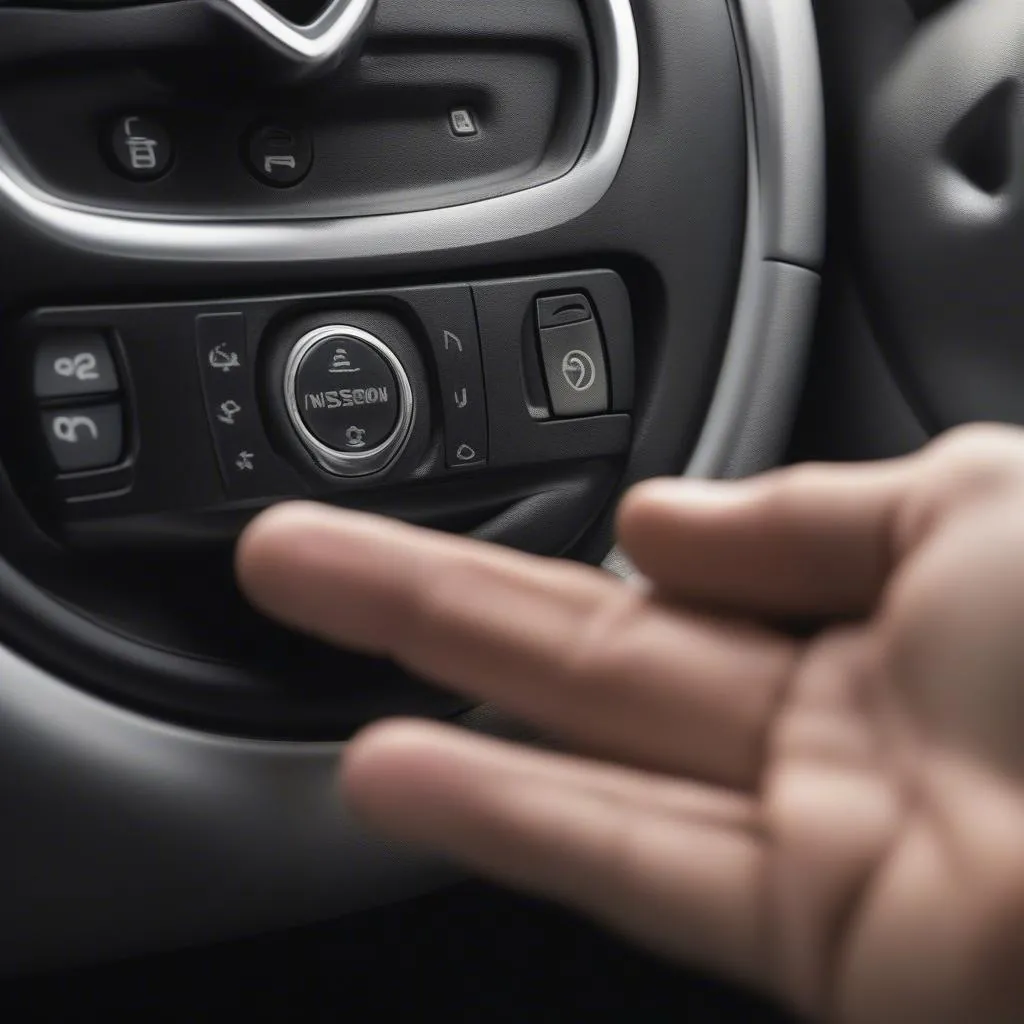The Nissan Rogue, a popular compact SUV, comes equipped with a standard anti-theft system designed to deter potential thieves. While the specifics of the system can vary slightly depending on the model year, this article will delve into the common components and features you can expect to find.
Understanding Your Nissan Rogue’s Anti-Theft System
It’s important to understand how your vehicle’s security system works to ensure its effectiveness. Let’s break down the key elements:
1. Engine Immobilizer System: Your First Line of Defense
At the heart of the Nissan Rogue’s anti-theft system lies the engine immobilizer. This sophisticated technology prevents the engine from starting without the presence of a recognized key fob.
How it Works:
- Transponder Chip: Each Nissan Rogue key fob houses a tiny transponder chip that emits a unique radio frequency identification (RFID) signal.
- Immobilizer Control Unit: The vehicle has a corresponding immobilizer control unit (ICU) that receives this signal.
- Authentication Process: When you attempt to start the car, the ICU communicates with the key fob’s transponder. If the signals match, the ICU authorizes the engine to start. If not, the engine remains immobilized, preventing unauthorized use.
2. Alarm System: A Powerful Deterrent
In addition to immobilizing the engine, the Nissan Rogue features a comprehensive alarm system designed to scare off potential thieves and alert you to any tampering.
Trigger Points:
- Forced Entry: Sensors in the doors, hood, and tailgate trigger the alarm if they detect forced entry.
- Interior Motion: Interior motion sensors activate the alarm if movement is detected inside the vehicle.
- Vehicle Inclination: Some models include inclination sensors that trigger the alarm if the vehicle is tilted, as in an attempted towing situation.
Alarm Response:
When triggered, the alarm system typically responds with:
- Audible Alarm: A loud, attention-grabbing siren sounds to deter the thief and alert others nearby.
- Visual Cues: The vehicle’s hazard lights may flash to signal the alarm activation.
 Nissan Rogue Alarm System
Nissan Rogue Alarm System
Troubleshooting Tips: When Things Go Wrong
While the Nissan Rogue’s anti-theft system is generally reliable, occasional issues can arise. Here are a few troubleshooting steps to consider:
- Key Fob Battery: A weak or dead key fob battery can interfere with the immobilizer system. Replace the battery and try again.
- Key Fob Synchronization: In some cases, the key fob may need to be resynchronized with the vehicle. Refer to your owner’s manual for instructions on how to reprogram your key fob.
- Sensor Malfunctions: If you suspect a sensor malfunction, it’s best to consult a qualified mechanic or Nissan dealership for diagnosis and repair. Diagnostic tools, such as those offered by Cardiagtech, can help pinpoint the issue.
FAQs: Common Questions About Your Nissan Rogue’s Security
Q: Can I add aftermarket anti-theft devices to my Nissan Rogue?
A: Yes, you can enhance your vehicle’s security by installing aftermarket devices such as steering wheel locks, brake pedal locks, or GPS tracking systems.
Q: What should I do if my Nissan Rogue’s alarm goes off accidentally?
A: To disarm the alarm, simply unlock your vehicle using the key fob or insert the key into the driver’s side door lock and turn it to the unlock position.
Q: Can I adjust the sensitivity of the alarm system?
A: The sensitivity of the factory-installed alarm system is generally pre-set and cannot be adjusted by the user.
 Nissan Rogue Key Fob Programming
Nissan Rogue Key Fob Programming
Need Expert Assistance? Cardiagtech is Here to Help!
Understanding and maintaining your Nissan Rogue’s anti-theft system is crucial for the security of your vehicle. For in-depth diagnostics, software solutions, or any assistance with your car’s electronics, reach out to Cardiagtech, your trusted partner in automotive technology. We offer a range of diagnostic and programming tools designed for both professionals and DIY enthusiasts.
Let CARDIAGTECH empower you to take control of your vehicle’s security!
